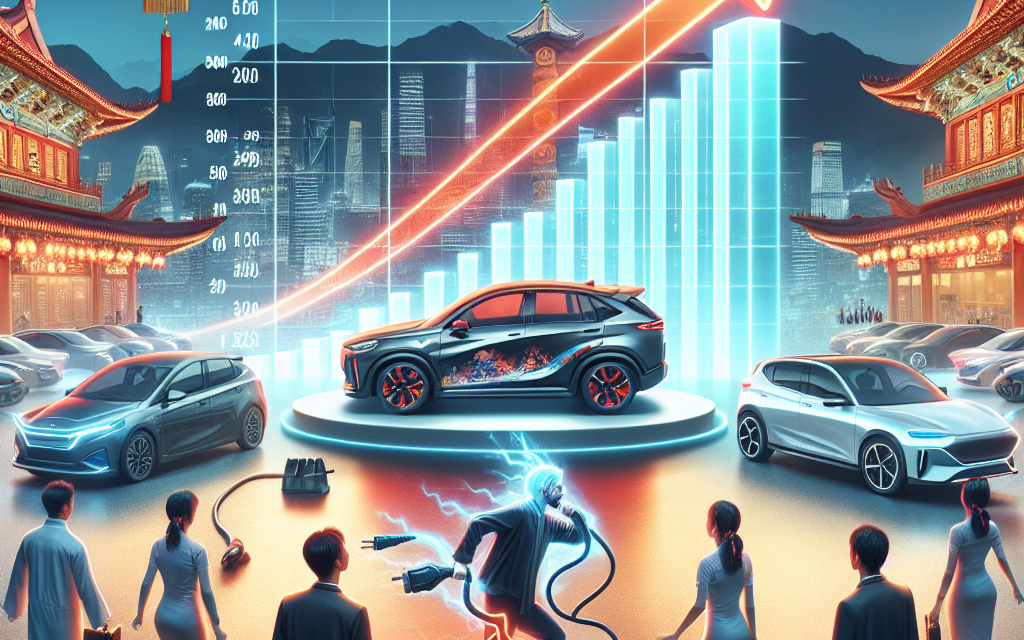“China’s Electric Revolution: Surge in EV Sales as Gasoline Vehicles Fade in 2024.”
Introduction
In 2024, China is witnessing a remarkable surge in electric car sales, marking a significant shift in the automotive landscape as consumers increasingly favor electric vehicles (EVs) over traditional gasoline-powered cars. This trend is driven by a combination of government policies promoting green energy, advancements in battery technology, and growing environmental awareness among consumers. As a result, sales of gasoline vehicles are experiencing a notable decline, reflecting a broader global transition towards sustainable transportation solutions. The rise of electric cars in China not only highlights the country’s commitment to reducing carbon emissions but also positions it as a leader in the global EV market.
Electric Car Market Growth in China
In 2024, the electric car market in China has experienced a remarkable surge, reflecting a significant shift in consumer preferences and government policies aimed at promoting sustainable transportation. This growth is particularly noteworthy as it coincides with a decline in gasoline vehicle sales, indicating a transformative moment in the automotive industry. The increasing adoption of electric vehicles (EVs) can be attributed to several interrelated factors, including advancements in technology, enhanced infrastructure, and a growing awareness of environmental issues.
One of the primary drivers of this growth is the rapid advancement in battery technology, which has led to improvements in the range, efficiency, and affordability of electric vehicles. Manufacturers are investing heavily in research and development to produce batteries that not only last longer but also charge faster. As a result, consumers are finding electric cars more appealing, as they can now travel greater distances without the anxiety of running out of power. This technological evolution has made electric vehicles a viable alternative to traditional gasoline-powered cars, thereby attracting a broader customer base.
Moreover, the Chinese government has played a pivotal role in fostering the electric vehicle market through a series of supportive policies and incentives. These measures include substantial subsidies for EV purchases, tax exemptions, and investments in charging infrastructure. The government’s commitment to reducing carbon emissions and promoting clean energy has created a conducive environment for the growth of electric vehicles. As a result, many consumers are now more inclined to consider electric cars, not only for their environmental benefits but also for the financial incentives that accompany their purchase.
In addition to government support, the expansion of charging infrastructure has significantly contributed to the rise in electric vehicle sales. The establishment of a comprehensive network of charging stations across urban and rural areas has alleviated concerns regarding the availability of charging options. This infrastructure development has made it more convenient for consumers to own and operate electric vehicles, further encouraging their adoption. As charging stations become more ubiquitous, the practicality of owning an electric car continues to improve, leading to increased sales.
Furthermore, the growing awareness of environmental issues among consumers has also influenced their purchasing decisions. As climate change becomes an increasingly pressing concern, many individuals are seeking ways to reduce their carbon footprint. Electric vehicles are often perceived as a more sustainable choice compared to gasoline cars, which emit harmful pollutants. This shift in consumer mindset has been instrumental in driving the demand for electric vehicles, as more people prioritize eco-friendly options in their daily lives.
As electric vehicle sales continue to rise, traditional gasoline vehicle sales are experiencing a notable decline. This trend signals a significant transformation in the automotive landscape, as consumers increasingly favor electric options over conventional vehicles. The decline in gasoline vehicle sales is not merely a temporary fluctuation; rather, it reflects a broader societal shift towards sustainability and innovation in transportation.
In conclusion, the electric car market in China is witnessing unprecedented growth in 2024, driven by advancements in technology, supportive government policies, improved infrastructure, and heightened environmental awareness. As the landscape of the automotive industry evolves, the decline in gasoline vehicle sales underscores a pivotal moment in the transition towards a more sustainable future. With these trends expected to continue, the electric vehicle market is poised for further expansion, solidifying its position as a cornerstone of modern transportation in China.
Factors Driving Electric Vehicle Adoption
The surge in electric car sales in China, coupled with the decline in gasoline vehicle sales in 2024, can be attributed to a confluence of factors that are reshaping the automotive landscape. One of the most significant drivers of this shift is the Chinese government’s robust policy framework aimed at promoting electric vehicles (EVs). Through a combination of subsidies, tax incentives, and stringent emissions regulations, the government has created a conducive environment for the adoption of electric vehicles. These policies not only lower the initial purchase price of EVs but also encourage manufacturers to invest in research and development, leading to improved technology and greater consumer confidence.
In addition to government support, the rapid advancement of battery technology has played a crucial role in the increasing popularity of electric vehicles. Innovations in battery efficiency and capacity have resulted in longer driving ranges and shorter charging times, addressing two of the most significant concerns potential buyers have regarding EVs. As a result, consumers are more inclined to consider electric vehicles as viable alternatives to traditional gasoline-powered cars. Furthermore, the growing availability of charging infrastructure across urban and rural areas has alleviated range anxiety, making electric vehicles more practical for everyday use.
Moreover, the rising awareness of environmental issues has significantly influenced consumer preferences. As climate change becomes an increasingly pressing global concern, many Chinese consumers are seeking sustainable alternatives to reduce their carbon footprint. Electric vehicles, which produce zero tailpipe emissions, align with this growing environmental consciousness. Consequently, consumers are not only motivated by the desire to save on fuel costs but also by the opportunity to contribute positively to the environment. This shift in consumer mindset has been further bolstered by extensive media coverage highlighting the detrimental effects of fossil fuel consumption on air quality and public health.
Another factor contributing to the surge in electric vehicle sales is the increasing variety of models available in the market. In recent years, automakers have expanded their electric vehicle offerings, providing consumers with a broader range of choices that cater to different preferences and budgets. From compact cars to luxury sedans and SUVs, the diversity of electric vehicles has made them more appealing to a wider audience. This expansion is not limited to domestic manufacturers; international brands are also entering the Chinese market with competitive electric models, further stimulating consumer interest.
Additionally, the economic landscape in China has shifted, with rising disposable incomes allowing more consumers to consider purchasing electric vehicles. As the middle class continues to grow, so does the demand for modern, technologically advanced vehicles. Electric cars, often equipped with the latest features and smart technology, resonate well with this demographic. The perception of electric vehicles as a status symbol is also gaining traction, as consumers increasingly associate them with innovation and sustainability.
In conclusion, the factors driving electric vehicle adoption in China are multifaceted and interconnected. Government policies, advancements in technology, heightened environmental awareness, a diverse range of models, and changing economic conditions all contribute to the remarkable shift in consumer preferences. As these trends continue to evolve, it is likely that the momentum behind electric vehicle sales will persist, further solidifying China’s position as a global leader in the transition to sustainable transportation. The decline in gasoline vehicle sales is not merely a statistical trend; it represents a significant cultural and technological transformation that is reshaping the future of mobility in the country.
Impact of Government Policies on EV Sales
The surge in electric vehicle (EV) sales in China, juxtaposed with the decline in gasoline vehicle sales in 2024, can be largely attributed to a series of proactive government policies aimed at promoting sustainable transportation. As the world’s largest automotive market, China has recognized the critical need to transition from fossil fuel dependency to cleaner energy alternatives, and this shift is reflected in the robust growth of the electric vehicle sector. The Chinese government has implemented a comprehensive framework of incentives, regulations, and infrastructure development that has significantly influenced consumer behavior and industry dynamics.
One of the most impactful measures has been the introduction of substantial subsidies for electric vehicle purchases. These financial incentives have made EVs more accessible to a broader segment of the population, effectively lowering the initial cost barrier that often deters potential buyers. By providing direct financial support, the government has not only stimulated demand but has also encouraged manufacturers to innovate and expand their offerings. As a result, consumers are presented with a diverse range of electric models that cater to various preferences and budgets, further driving sales.
In addition to subsidies, the Chinese government has established stringent emissions regulations for gasoline vehicles, which have compelled automakers to pivot towards electric alternatives. These regulations are designed to reduce air pollution and greenhouse gas emissions, aligning with China’s broader environmental goals. As manufacturers face increasing pressure to comply with these standards, many have accelerated their investments in electric vehicle technology and production capabilities. This shift not only enhances the competitiveness of EVs but also positions China as a leader in the global electric vehicle market.
Moreover, the expansion of charging infrastructure has played a crucial role in facilitating the transition to electric vehicles. The government has invested heavily in the development of charging stations across urban and rural areas, addressing one of the primary concerns of potential EV buyers: range anxiety. By ensuring that charging facilities are readily available, the government has alleviated fears associated with the practicality of owning an electric vehicle. This infrastructure development has not only made EV ownership more convenient but has also fostered a positive perception of electric vehicles among consumers.
Furthermore, the promotion of research and development in battery technology has significantly enhanced the appeal of electric vehicles. The Chinese government has prioritized advancements in battery efficiency and longevity, which are critical factors influencing consumer decisions. As battery technology continues to improve, electric vehicles are becoming increasingly competitive with their gasoline counterparts in terms of performance and range. This technological progress has not only bolstered consumer confidence but has also attracted investment from both domestic and international players in the automotive industry.
In conclusion, the remarkable surge in electric vehicle sales in China, coupled with the decline in gasoline vehicle sales in 2024, can be largely attributed to the strategic government policies that have fostered a conducive environment for EV adoption. Through financial incentives, stringent regulations, infrastructure development, and advancements in technology, the Chinese government has effectively catalyzed a shift in consumer preferences towards electric vehicles. As these policies continue to evolve, they are likely to further entrench the dominance of electric vehicles in the Chinese automotive market, setting a precedent for other countries to follow in their pursuit of sustainable transportation solutions.
Comparison of Electric and Gasoline Vehicle Sales
In 2024, the automotive landscape in China has undergone a significant transformation, marked by a notable surge in electric vehicle (EV) sales juxtaposed against a decline in gasoline vehicle sales. This shift reflects broader trends in consumer preferences, government policies, and technological advancements that are reshaping the market. As the world’s largest automotive market, China serves as a critical case study in understanding the dynamics between electric and gasoline vehicles.
The rise in electric vehicle sales can be attributed to several interrelated factors. First and foremost, the Chinese government has implemented a series of incentives aimed at promoting the adoption of electric vehicles. These incentives include subsidies for EV purchases, tax exemptions, and investments in charging infrastructure, all of which have made electric vehicles more accessible and appealing to consumers. As a result, the market has witnessed a dramatic increase in the number of electric vehicles sold, with many manufacturers ramping up production to meet the growing demand. In contrast, gasoline vehicle sales have experienced a downturn, as consumers increasingly gravitate towards more sustainable and environmentally friendly options.
Moreover, advancements in battery technology have played a pivotal role in enhancing the appeal of electric vehicles. With improvements in battery efficiency and reductions in charging times, electric vehicles are becoming more practical for everyday use. This technological progress has not only increased the driving range of electric vehicles but has also alleviated concerns regarding the availability of charging stations. Consequently, consumers are more inclined to consider electric vehicles as viable alternatives to traditional gasoline-powered cars. In this context, the decline in gasoline vehicle sales can be seen as a direct response to the growing confidence in electric vehicle technology.
Additionally, the changing attitudes of consumers towards environmental sustainability have further fueled the shift towards electric vehicles. As awareness of climate change and air pollution rises, many consumers are actively seeking ways to reduce their carbon footprint. Electric vehicles, which produce zero tailpipe emissions, align with these values and are increasingly viewed as a responsible choice. This shift in consumer sentiment has been instrumental in driving the growth of electric vehicle sales, while simultaneously contributing to the decline of gasoline vehicle sales.
Furthermore, the competitive landscape within the automotive industry has also evolved, with numerous manufacturers entering the electric vehicle market. Traditional automakers are expanding their electric vehicle offerings, while new entrants, particularly startups, are challenging established players with innovative designs and technologies. This increased competition has led to a wider variety of electric vehicles available to consumers, catering to diverse preferences and budgets. In contrast, the gasoline vehicle market has become increasingly saturated, with fewer innovations and a diminishing appeal as consumers shift their focus towards electric alternatives.
In summary, the comparison of electric and gasoline vehicle sales in China in 2024 highlights a significant shift in consumer behavior and market dynamics. The surge in electric vehicle sales, driven by government incentives, technological advancements, and changing consumer attitudes, stands in stark contrast to the decline in gasoline vehicle sales. As the automotive industry continues to evolve, it is evident that electric vehicles are not merely a passing trend but rather a fundamental component of the future of transportation in China and beyond. This transformation underscores the importance of sustainability and innovation in shaping the automotive landscape, paving the way for a cleaner and more efficient future.
Consumer Preferences Shifting Towards EVs
In recent years, the automotive landscape in China has undergone a significant transformation, marked by a pronounced shift in consumer preferences from traditional gasoline vehicles to electric vehicles (EVs). This trend has become particularly evident in 2024, as sales figures reveal a remarkable surge in electric car purchases, coinciding with a notable decline in gasoline vehicle sales. Several factors contribute to this evolving consumer behavior, reflecting broader societal changes, technological advancements, and government policies aimed at promoting sustainable transportation.
One of the primary drivers of this shift is the increasing awareness of environmental issues among Chinese consumers. As concerns about air pollution and climate change continue to rise, many individuals are seeking more sustainable alternatives to traditional vehicles. Electric cars, which produce zero tailpipe emissions, have emerged as a viable solution for environmentally conscious consumers. This growing awareness is not only influencing individual purchasing decisions but is also shaping public discourse around transportation and sustainability in China.
Moreover, advancements in EV technology have played a crucial role in changing consumer perceptions. The rapid development of battery technology has led to significant improvements in the range and performance of electric vehicles, addressing one of the primary concerns that potential buyers have had in the past. As a result, many consumers now view EVs as practical alternatives to gasoline vehicles, capable of meeting their daily transportation needs without the anxiety of running out of charge. This shift in perception is further reinforced by the increasing availability of charging infrastructure, which has made owning an electric vehicle more convenient than ever.
In addition to environmental considerations and technological advancements, government policies have also been instrumental in driving the shift towards electric vehicles. The Chinese government has implemented a range of incentives to encourage the adoption of EVs, including subsidies for consumers, tax breaks, and investments in charging infrastructure. These initiatives not only make electric vehicles more financially accessible but also signal a strong commitment to fostering a sustainable automotive industry. As a result, consumers are increasingly motivated to consider electric vehicles as a viable option, knowing that they are supported by favorable policies.
Furthermore, the growing variety of electric vehicle models available in the market has contributed to changing consumer preferences. In the past, consumers may have been deterred by the limited options in terms of design, features, and price points. However, as more manufacturers enter the EV market, consumers now have access to a diverse range of models that cater to different tastes and budgets. This increased competition has not only driven innovation but has also made electric vehicles more appealing to a broader audience.
As consumer preferences continue to evolve, it is clear that the automotive industry in China is at a pivotal moment. The surge in electric car sales, coupled with the decline in gasoline vehicle sales, reflects a fundamental shift in how consumers view transportation. This transformation is not merely a trend but rather a reflection of deeper societal values that prioritize sustainability, technological advancement, and government support. As these factors converge, it is likely that the momentum towards electric vehicles will only strengthen in the coming years, further solidifying their place in the future of transportation in China. Ultimately, this shift not only benefits consumers but also contributes to a more sustainable and environmentally friendly automotive landscape.
Technological Advancements in Electric Vehicles
The surge in electric car sales in China, coupled with the decline in gasoline vehicle sales in 2024, can be attributed to a myriad of technological advancements that have significantly enhanced the appeal and practicality of electric vehicles (EVs). As the automotive industry evolves, innovations in battery technology, charging infrastructure, and vehicle design have played pivotal roles in transforming consumer perceptions and driving adoption rates.
One of the most notable advancements is in battery technology, particularly the development of lithium-ion batteries with higher energy densities. These batteries not only provide longer ranges on a single charge but also improve the overall efficiency of electric vehicles. As manufacturers invest in research and development, breakthroughs such as solid-state batteries are on the horizon, promising even greater safety and performance. This progress has alleviated one of the primary concerns for potential EV buyers: range anxiety. With many new models offering ranges that rival traditional gasoline vehicles, consumers are increasingly willing to make the switch.
In addition to battery improvements, the expansion of charging infrastructure has been instrumental in facilitating the growth of electric vehicle sales. The Chinese government has made significant investments in building a comprehensive network of charging stations, making it more convenient for drivers to recharge their vehicles. Fast-charging technology has also advanced, allowing EVs to be charged to 80% in as little as 30 minutes. This convenience mirrors the refueling experience of gasoline vehicles, further encouraging consumers to consider electric options. As charging stations become more ubiquitous, the practicality of owning an electric vehicle continues to improve, making it a more viable choice for the average consumer.
Moreover, advancements in vehicle design and manufacturing processes have led to the production of electric cars that are not only efficient but also aesthetically appealing and technologically sophisticated. Many new electric models come equipped with cutting-edge features such as advanced driver-assistance systems, enhanced connectivity, and smart technology integration. These features not only enhance the driving experience but also align with the preferences of a tech-savvy consumer base that values innovation and sustainability. As a result, electric vehicles are increasingly seen as desirable, modern alternatives to traditional gasoline cars.
Furthermore, the integration of renewable energy sources into the electric vehicle ecosystem has bolstered the environmental appeal of EVs. As more charging stations utilize solar or wind energy, the carbon footprint associated with electric vehicle operation diminishes. This alignment with global sustainability goals resonates with consumers who are increasingly conscious of their environmental impact. Consequently, the shift towards electric vehicles is not merely a trend but a significant movement towards a more sustainable future.
In conclusion, the technological advancements in electric vehicles have created a compelling case for their adoption in China, leading to a remarkable surge in sales as gasoline vehicle sales decline in 2024. The improvements in battery technology, the expansion of charging infrastructure, and the evolution of vehicle design have collectively transformed the landscape of the automotive industry. As these trends continue to evolve, it is likely that electric vehicles will play an even more prominent role in the future of transportation, further solidifying their position as a sustainable and practical choice for consumers. The ongoing commitment to innovation and sustainability will undoubtedly shape the trajectory of the automotive market in the years to come.
Future Trends in China’s Automotive Industry
The automotive industry in China is undergoing a significant transformation, marked by a notable surge in electric vehicle (EV) sales alongside a decline in gasoline vehicle sales in 2024. This shift is not merely a fleeting trend but rather a reflection of broader changes in consumer preferences, government policies, and technological advancements. As the world’s largest automotive market, China’s evolving landscape offers valuable insights into the future of transportation, both domestically and globally.
One of the primary drivers of this transition is the Chinese government’s commitment to reducing carbon emissions and promoting sustainable energy sources. In recent years, the government has implemented a series of policies aimed at encouraging the adoption of electric vehicles. These include substantial subsidies for EV buyers, investments in charging infrastructure, and stringent emissions regulations for traditional gasoline vehicles. As a result, consumers are increasingly inclined to consider electric options, leading to a remarkable uptick in sales figures. In 2024, electric vehicles accounted for a significant portion of new car registrations, signaling a decisive shift in consumer behavior.
Moreover, advancements in battery technology have played a crucial role in enhancing the appeal of electric vehicles. With improvements in energy density, charging speed, and overall efficiency, modern EVs are becoming more practical for everyday use. Consumers are now more confident in the range and performance of electric vehicles, which has contributed to their growing popularity. As manufacturers continue to innovate and develop more efficient battery systems, the gap between electric and gasoline vehicles is expected to narrow further, making EVs an increasingly attractive option for a broader audience.
In addition to government support and technological advancements, the changing attitudes of consumers are also shaping the future of China’s automotive industry. Younger generations, in particular, are more environmentally conscious and are actively seeking sustainable alternatives to traditional vehicles. This demographic shift is influencing automakers to prioritize electric vehicle development and marketing strategies that resonate with eco-friendly values. As a result, the automotive landscape is becoming increasingly diverse, with a wide range of electric models catering to various consumer preferences and budgets.
Furthermore, the competitive landscape within the automotive sector is evolving rapidly. Traditional automakers are now facing stiff competition from new entrants, particularly startups focused exclusively on electric vehicles. These companies are often more agile and innovative, pushing established manufacturers to accelerate their transition to electric mobility. This competition is fostering a dynamic environment where continuous improvement and adaptation are essential for survival. As a consequence, consumers are benefiting from a broader selection of electric vehicles, often at more competitive prices.
Looking ahead, the trajectory of China’s automotive industry suggests that the momentum behind electric vehicle adoption will only continue to grow. As infrastructure improves and consumer acceptance increases, the decline of gasoline vehicle sales is likely to persist. Additionally, the global push towards sustainability and the reduction of fossil fuel dependency will further reinforce this trend. In this context, automakers that embrace electric mobility and invest in sustainable practices will be well-positioned to thrive in the evolving market.
In conclusion, the surge in electric car sales in China, coupled with the decline in gasoline vehicle sales, marks a pivotal moment in the automotive industry. This transformation is driven by a confluence of government initiatives, technological advancements, and shifting consumer preferences. As the landscape continues to evolve, it is clear that electric vehicles will play a central role in shaping the future of transportation in China and beyond.
Q&A
1. **Question:** What is the primary reason for the surge in electric car sales in China in 2024?
**Answer:** The primary reason is the Chinese government’s strong support for electric vehicles (EVs) through subsidies, incentives, and infrastructure development.
2. **Question:** How much did electric car sales increase in China in 2024 compared to the previous year?
**Answer:** Electric car sales in China increased by approximately 30% in 2024 compared to 2023.
3. **Question:** What impact has the decline in gasoline vehicle sales had on the automotive market in China?
**Answer:** The decline in gasoline vehicle sales has led to a significant shift in the automotive market towards EVs, prompting traditional automakers to accelerate their electric vehicle offerings.
4. **Question:** Which segment of electric vehicles saw the most growth in 2024?
**Answer:** The segment of affordable electric vehicles, particularly compact and subcompact models, saw the most growth in 2024.
5. **Question:** What role do charging infrastructure developments play in the rise of electric car sales?
**Answer:** The expansion of charging infrastructure has made EV ownership more convenient, alleviating range anxiety and encouraging more consumers to switch to electric vehicles.
6. **Question:** How are consumer attitudes towards electric vehicles changing in China?
**Answer:** Consumer attitudes are increasingly positive, with growing awareness of environmental issues and the long-term cost savings associated with electric vehicles.
7. **Question:** What challenges do electric vehicle manufacturers face despite the surge in sales?
**Answer:** Manufacturers face challenges such as supply chain issues, competition from both domestic and international brands, and the need for continuous innovation in battery technology.
Conclusion
In 2024, the surge in electric car sales in China, driven by government incentives, advancements in battery technology, and increasing consumer awareness of environmental issues, has significantly outpaced the decline in gasoline vehicle sales. This shift reflects a broader transition towards sustainable transportation, positioning China as a global leader in the electric vehicle market and indicating a pivotal change in consumer preferences and regulatory landscapes. The decline in gasoline vehicle sales underscores the urgency for traditional automakers to adapt to this evolving market or risk obsolescence.





